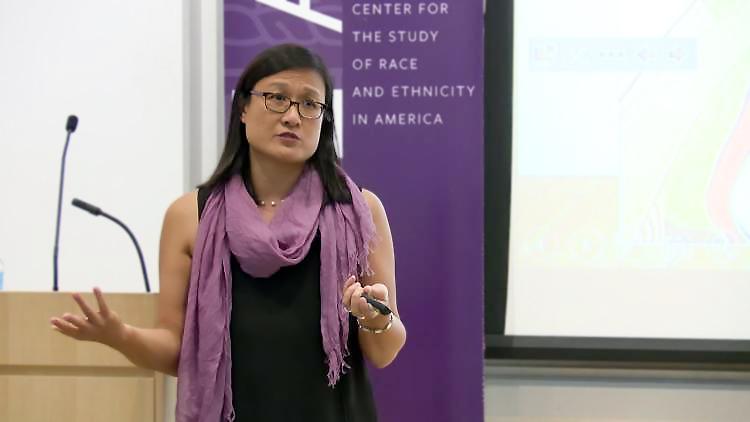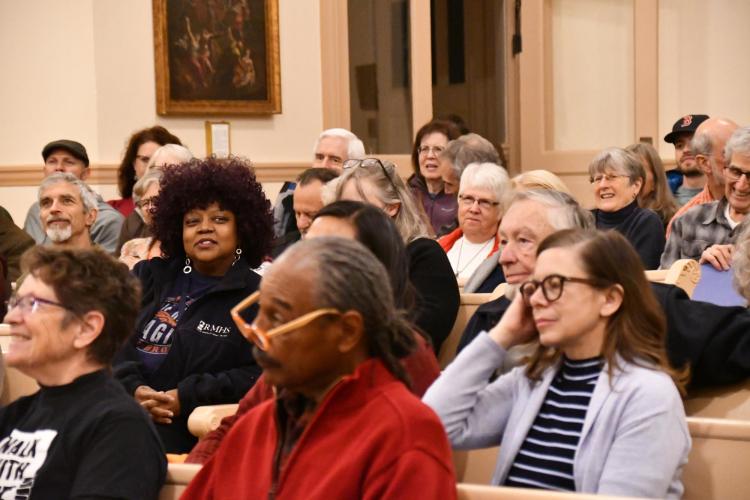The ‘arts and humanities give meaning to our lives’
Jennifer Ho, director of CU Boulder’s Center for Humanities & the Arts, discusses the state of arts and humanities in higher education as the center prepares to celebrate its 25th anniversary, and she champions the inherent value of the arts and humanities
The Center for Humanities & the Arts (CHA) at the University of Colorado Boulder turns 25 this year.
To commemorate the quarter-century milestone, CHA is hosting a celebration from 3:30 p.m. to 5 p.m. on Wednesday, Feb. 15, at the Center for Academic Success and Engagement (CASE) building’s Center for Teaching and Learning (CTL), CASE E390. Registration for the event is recommended and can be completed at this link. For more information on the event, visit the CHA website’s 25-year anniversary webpage.

At the top of the page: A scene from the Colorado Shakespeare Festival's 2019 production of Twelfth Night. Above: Jennifer Ho, CHA director and ethnic studies professor, teaches courses on Asian American culture and Critical Race Theory at CU Boulder.
Jennifer Ho, CHA director and ethnic studies professor, said the celebration will offer an opportunity to look back on CHA’s successes and to discuss and plan how to promote, support and celebrate the arts and humanities.
Ho recently participated in a five-question interview about the current state of arts and humanities in higher education, looming challenges for arts and humanities scholarship, strategies CHA employs as it strives to be an effective advocate for the arts and humanities, and more. Her responses follow below.
Question: How has the situation for the arts and humanities in higher education changed over the last quarter century?
Ho: I think there’s a tendency to lament the decline of arts and humanities, especially humanities, in higher education, because we see a declining number of arts and humanities majors and decreased funding. And that’s definitely a part of the narrative at CU Boulder and nationwide.
However, there have also been more humanities and arts centers that have opened nationwide in the last 25 years—one at Brandeis just started up a year ago—and the scholarship and artistic productions by faculty, students, and staff have continued to flourish, on and off campus.
One positive change that I’ve noticed is an opening up of what we consider to be valuable works of arts and humanities—showcasing both the artistry and scholarship of faculty of color on subjects that 25 years ago we wouldn’t have been seeing depicted in art and music or validated through scholarship such as transgender issues, addressing Islamophobia, centering Black joy, and using an equity, inclusivity and justice lens within arts and humanities—that’s definitely a positive change I’ve seen in the last 25 years.
Question: What do you see as the immediate and looming challenge to arts and humanities scholarship generally and also at CU Boulder?
Ho: Politics and money. These are the two most pressing challenges to arts and humanities nationally and perhaps at CU Boulder. Financially the CHA is fine, for now, though we rely on the generosity of the university for our budget—and if that changed, we wouldn’t be able to offer the grants, fellowships, awards and programs that make the CHA a vital hub on campus for arts and humanities.
I’d love to be able to endow some of our programs; for example, to raise a million dollars so that we’ll always be able to fund graduate students with dissertation fellowships, summer awards and material grants for student artists.
Politically, I believe things are fine for now at CU Boulder, but like most people I’m keeping my eye on what is happening in Florida. The book bans, the bills preventing people from teaching certain subjects, what’s happening at the New College of Florida—all of this is very concerning about the political climate in education that impacts those of us working in arts and humanities.
In fact, next year at the CHA, we are hoping to take this up as a theme: Liberty, Freedom, Democracy and the Fight for Ideas. We often see words like “liberty,” “freedom,” “democracy” invoked by people who tend to be on the more conservative side of the spectrum, and I’d like to delve into what we mean when we use these terms and what freedom of thought and expression actually looks like relative to the work we do at the CHA in supporting arts and humanities.
We don’t just need science; we need critical thinking skills of interpretation to think about these as human issues."
Question: If a student or parent asked you to explain the “value” of the arts and humanities, how might you respond?
Ho: I love getting this question because it allows me to show my passion for arts and humanities, because the first thing I’d say is that arts and humanities give meaning to our lives. And then I’d say that they teach us how to think critically about our world. Art is literally and figuratively the color, sound, movement and texture of our world.
When the pandemic had us sheltering at home, we turned to stories and art and music to alleviate our anxiety and provide solace in our uncertainty. And humanities courses don’t just teach us how to write better (which is what many people will say is the value of humanities)—humanities courses and books help us think better—they push us to critically examine the world and ask not just “what” is happening but “why” and “how.”
If we didn’t have humanities scholarship, we wouldn’t be able to solve some of the world’s most pressing problems—because we don’t just need science; we need critical thinking skills of interpretation to think about these as human issues.
Question: What strategies does the CHA employ as it strives to be the most effective advocate for the arts and humanities?
Ho: I think and talk in terms of stories—and the stories that the CHA has to share about why arts and humanities are vital is the most effective way I know for us to advocate for arts and humanities.

An audience gathered at a CHA event titled “Difficult Dialogues: Being Black in Boulder” in the Fall of 2022. The event included a film screening and then a panel discussion that featured Jennifer Ho as one of the panelists.
A story I tell about bridging the CHA to the greater Boulder County community involves a competition we held for CU Boulder staff, students and faculty to produce works of arts and humanities that engaged the theme of “resilience” in light of the Boulder King Soopers mass shooting.
The entries we received were powerful and poignant—and the winning submission was by a CU Boulder undergraduate student who was a survivor and witness to that tragic day—who wrote a series of letters to March 22 (the day of the shooting). You can find them and the other winning entries on our website.
We then had a community event at Chautauqua where the awardees spoke about their works. It was a powerful event—and a reminder that arts and humanities have the ability to do so much: to heal, to communicate, to inspire and to witness.
The student who wrote her letters to March 22 did so because of our competition and it became part of her healing from this horrific event. This is one story among many about why arts and humanities are so crucial to our lives.
Question: You hold three degrees in English. What drew you to this discipline, and how does your experience dovetail with the mission of CHA?
Ho: Stories. Stories. Stories. That’s why all my degrees are in English. I taught myself to read when I was 5, because I didn’t want to rely on my parents reading to me—it’s among my first memories: being on my sofa and sounding out words and figuring out the stories in my picture book.
Fiction is my first true love because it allowed me to travel to multiple worlds in different bodies—and it still does. Who tells stories to whom and for what purpose—this is a powerful tool to have.
When I started college, I realized it wasn’t just the pleasure of reading novels that I wanted to explore, but the power of representation. The first time I read a book written by a Chinese-American author about Chinese-American experiences was when I was a first year student at UC Santa Barbara.
That moment changed my life—because up until then, I didn’t think Chinese or Asian American people wrote books—because I had never been assigned a book by an Asian American person and never had a librarian direct me to any Asian American books, fiction or non-fiction. Seeing yourself reflected in stories is a powerful thing—and not seeing that is also powerful, because it means you don’t have a model of what you can be if you can’t see yourself reflected in narrative.
At the CHA, we want everyone to be able to tell their own story—whether that’s in the form of scholarship, music, media, visual art, dance, drama, or so many of the other disciplines that inform humanities and arts. So, I think my love of stories and my desire to have people tell their stories and be inspired by the stories of others works well at the CHA.

